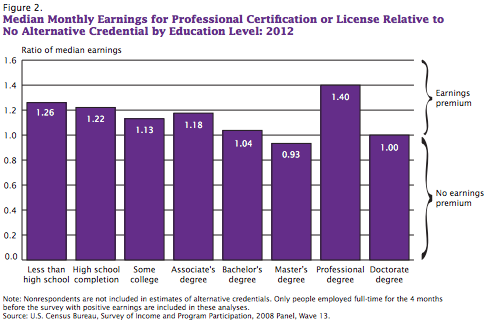You have /5 articles left.
Sign up for a free account or log in.
WASHINGTON -- The federal government for the first time has data on the 50 million U.S. adults who hold some form of educational credential that isn't a college degree.
The U.S. Census Bureau on Thursday released a report on the numbers and characteristics of people who hold certificates, professional certification and licenses. It also includes wage information.
Experts said the new data could help shift policy makers’ view of postsecondary education as well as the debate over college completion.
For example, the report found that 11.2 million adults who hold a high school diploma or less have earned a professional certificate or license. That means 5 percent of Americans have not attended college but have some education beyond high school.
“If this alternative credential were incorporated into an expanded measure of education, these 11.2 million people might be recategorized into the ‘more than high school’ category,” the report said, “representing a shift of almost 5 percent of the adult population.”
The report also showed that non-degree credentials can lead to increased earnings. Over all, people working full time while holding some form of alternative credential earned more than those without one.
That is good news, said Mary Alice McCarthy, a senior policy analyst for the New America Foundation, who previously worked for both the U.S. Labor and Education Departments.
"For those in the ‘some college’ category, there are ways they can get better labor market outcomes, even if they’re not ready to go the degree route,” McCarthy said.
The Census Bureau cautions that the data are just the first step in what is intended to be a “continued examination” of educational attainment, enrollment and wage data on non-degree credential holders. That means more information on everything from professional cosmetology certifications to architectural licenses and nursing certificates.
Anthony P. Carnevale is director of Georgetown University’s Center on Education and the Workforce. He is an expert on the value of credentials and has recently written about the impressive wage returns of many forms of college-issued certificates.
Carnevale said the Census report is a welcome addition to efforts to understand the employment outcomes of various forms of credentials.
“This is an attempt to begin making those connections,” he said. “This will influence policy.”
Students generally cannot tap into federal financial assistance as they work toward earning licenses and certifications. And while some forms of federal aid, such as Perkins vocational education grants, can be used for non-credit courses and certificates, its availability is inconsistent and varies by state.
Lawmakers could decide to move more federal money to alternative credential programs, particularly if federal data show that they lead to well-paid jobs.
“We’ve got this big, messy system out there,” said Carnevale. “There’s an issue about what the public should be paying for.”
However, Carnevale also said the Census information needs to be further developed before strong policy conclusions about it can be drawn. It does not track the employment outcomes at the institutional or programmatic levels, for example. And the federal government lacks the ability to track students' transcript data as they move through the system.
Even so, the report is an “indication of where the world’s gone,” Carnevale said, as it shows that one in four adults in the U.S. holds some form of alternative credential.
Five Years in the Works
President Obama got the ball rolling for the new Census reporting with his State of the Union speech five years ago. (Ironically, he was speaking to a different segment of higher education as the Census data was released Thursday.)
In that 2009 speech Obama set the goal for the U.S. to lead the world in college completion. But he also defined completion as one year of higher education or career training -- not a degree.
“This can be a community college or a four-year school, vocational training or an apprenticeship,” Obama said. “But whatever the training may be, every American will need to get more than a high school diploma.”
As a result, the U.S. Department of Education and its National Center for Education Statistics began working with other federal agencies to better understand non-degree credentials. The Census report grew out of that work.
“It makes sense that the department would want to measure smaller and smaller measures of skill,” said Louis Soares, vice president for policy research and strategy at the American Council on Education.
The wage data released Thursday shows that alternative credentials generally pay off. However, the report doesn’t make a case against degrees. That’s because the findings indicate that many degree holders earn certificates or licenses as add-ons to their more traditional higher education.
For example, professional degree holders – like lawyers and doctors – get a pay bump when they also hold a professional certification or license, according to the data.
 The same finding holds for people with some college education but no degree, including certificate holders. Alternative credential holders in this group earn more than their peers.
The same finding holds for people with some college education but no degree, including certificate holders. Alternative credential holders in this group earn more than their peers.
“At low levels of regular education, there is routinely an earnings premium for a professional certification or license or an educational certificate,” the report said.
There is much work to be done to analyze and build upon the Census data, said Carnevale. He and other researchers are beginning that process.
Their goal will be to learn about what works in an increasingly fragmented and unbundled higher education system. Or, as Soares said, to tease out the question of “what does that bundle of credentials mean?”




